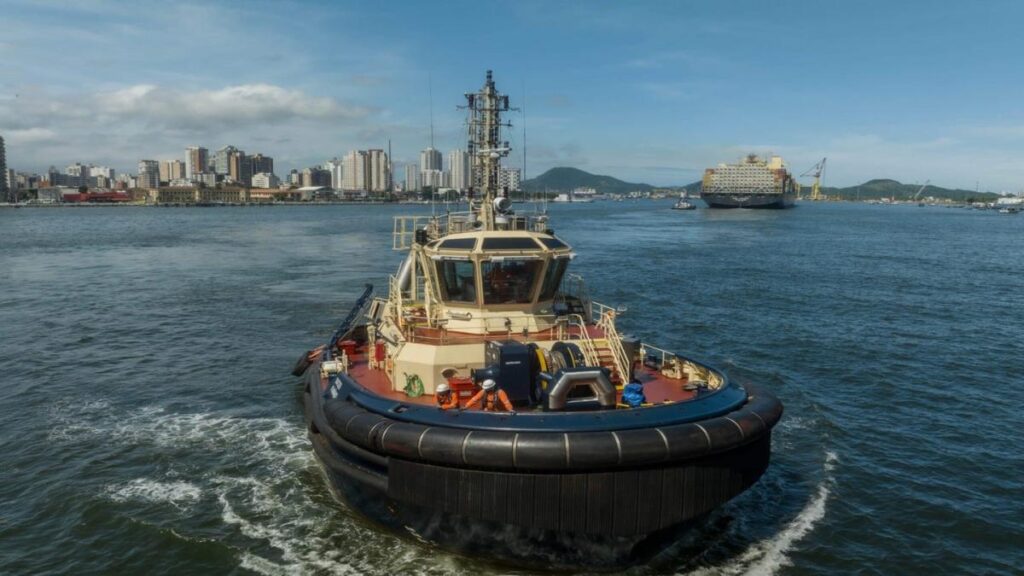Svitzer, a leading provider of towage and marine services, has officially commenced operations at the Port of Itaqui in Sao Luis, Maranhão, Brazil. This significant expansion resulted from an investment exceeding 650 million reals (around $125 million) over the course of nine years. The Port of Itaqui is recognized as a vital logistical hub within Brazil’s extensive port system, particularly important for the Central-North and Central Brazil corridors. The facilities available at the port include advanced grain and fuel storage, deep berths capable of accommodating large vessels, and efficient multimodal transport connections, all of which contribute significantly to the region’s economic development and the country’s overall trade capacity.
Arjen Van Dijk, the managing director of Svitzer Americas, emphasized the vital role that the Port of Itaqui plays in the movement of cargo within the Corredor Centro-Norte and Brazil’s Central-West region. He expressed pride in Svitzer’s ability to support its customers while simultaneously contributing to the ongoing development of Brazil’s national trade and logistics systems. This latest expansion not only improves Svitzer’s operational footprint along the Brazilian coastline but also complements its existing services at eight other ports throughout the country, thereby enhancing the company’s overall national presence in the maritime sector.
To support its operations in Maranhão, Svitzer has dispatched two specialized tugboats, namely the Svitzer Denise and the Svitzer Joaquim R. These vessels, designed as Azimuth Stern Drive (ASD) models, have been specifically tailored to meet the operational needs of the Port of Itaqui, as well as those of the adjacent Ponta da Madeira and Alumar ports. The inclusion of these and other modern tugboats marks an evolution in Svitzer’s capabilities, ensuring safe maneuvering and effective towage services in a busy and challenging maritime environment.
The fleet of Svitzer Brazil consists of 22 tugboats that are currently in operation, with plans for further expansion as three additional ASD vessels are under construction. These new vessels, designed by the renowned Robert Allan, are being built at the Rio Maguari shipyard located in Belem, Pará. Daniel Cohen, president of Svitzer Brazil, noted that the entry into the Port of Itaqui underscores the company’s long-term commitment to the Brazilian market as well as the strategic importance of this public port. As the largest public port in northern and northeastern Brazil, and the fourth largest nationally, Itaqui is pivotal for regional exports, particularly for key commodities like iron ore and soybeans.
This latest venture is part of an ongoing strategy for Svitzer to enhance its capabilities and efficiency. Earlier this May, the company announced the delivery of the Svitzer Babitonga, the final vessel in a series of six constructed under the 2300 Rampart Series. These new vessels represent Svitzer’s dedication to modernizing its fleet and improving operational standards across its services. Moreover, Svitzer continues to innovate by introducing the IMO Tier III-compliant tug, the Svitzer Jubilee, which operates at the Port of Tyne. This particular vessel is equipped with advanced technology, including a selective catalytic reduction (SCR) system that significantly reduces nitrogen oxide emissions, thereby aligning with global environmental standards.
In conclusion, the commencement of towage services by Svitzer at the Port of Itaqui marks a significant milestone in the company’s growth and an important development for Brazil’s maritime logistics. This investment not only enhances Svitzer’s operational network throughout the country but also establishes the Port of Itaqui as a central hub for crucial cargo movements. With a commitment to supporting the economy, improving environmental performance, and expanding its fleet, Svitzer is poised to play an integral role in shaping the future of marine services in Brazil. The launch of operations at this strategic port is a testament to Svitzer’s long-standing dedication to enhancing trade and logistics in Brazil, ultimately benefiting both its customers and the national economy.

